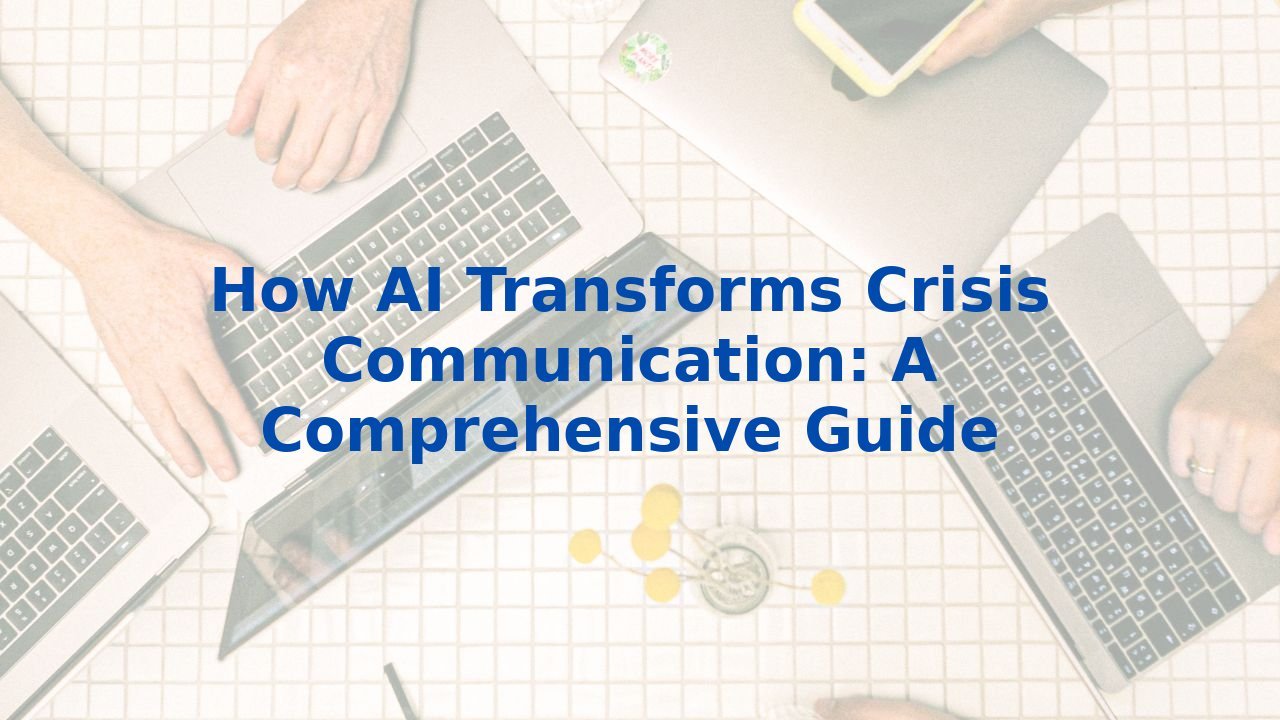How AI Transforms Crisis Communication: A Comprehensive Guide
How AI Transforms Crisis Communication: A Comprehensive Guide
Introduction
In our rapidly evolving business landscape, the significance of effective communication cannot be overstated, especially during times of crisis. The ability to act swiftly and maintain transparency with stakeholders is of utmost importance. Enter artificial intelligence (AI): a game-changing ally that elevates communication processes to new heights. This guide delves into the transformative role of AI in crisis communication, illustrating how it enhances efficiency, accuracy, and ultimately, the overall management of challenging situations.
The Role of AI in Crisis Communication
It's fascinating to see how AI can revolutionize the way we handle crises. Its capability to automate and streamline communication processes leads to substantial improvements. Let’s explore some pivotal contributions of AI:
- Rapid Response: AI can analyze extensive amounts of data in record time, pinpointing the root causes of incidents. This swift analysis is crucial in formulating an effective crisis management strategy that addresses issues head-on.
- Automated Communication: Imagine having AI-powered chatbots and messaging systems tirelessly providing immediate responses to customer inquiries. This not only alleviates the pressure on human resources but also ensures stakeholders are kept informed in real time.
- Content Generation: AI tools can quickly craft high-quality, context-specific content—be it press releases, social media updates, or internal communications. Such efficiency promotes a consistent message across all platforms, promoting clarity in times of uncertainty.
- Data Analysis: With the remarkable ability to process large datasets, AI identifies critical trends and patterns. This data-driven insight is invaluable when making informed decisions during crises.
Benefits of AI in Crisis Management
Incorporating AI into crisis communication brings with it a plethora of benefits:
- Enhanced Efficiency: By automating routine tasks, AI frees up human resources to focus on what truly matters—strategic crisis management.
- Improved Accuracy: The risk of human error is significantly minimized through AI, ensuring that responses are not only accurate but consistent across all channels.
- Real-Time Updates: There is undeniable value in providing real-time updates. AI can keep stakeholders informed and reduce the likelihood of misinformation spreading during critical moments.
- Scalability: For large-scale crises, AI's ability to handle thousands of communications simultaneously ensures that every voice is heard, and every query is addressed.
The Importance of Training Employees for AI
As powerful as AI is, its potential is only fully realized when combined with human insight. The quality of data fed into AI models and the interactions employees have with these systems can dramatically influence outcomes. Training employees to work cohesively with AI is essential, and here’s why:
- Data Quality: Employees must understand the nuances of providing high-quality data. The integrity of outputs directly correlates with the quality of input, making this training paramount.
- Contextual Understanding: While AI can generate content, human oversight is key to ensuring that the output is relevant and appropriate for the specific context of a crisis.
- Ethical Considerations: Knowledge of ethical implications surrounding data privacy and intellectual property rights equips employees to navigate potential legal challenges effectively.
Conclusion
Artificial intelligence is undeniably revolutionizing crisis communication, offering unprecedented levels of efficiency and accuracy. However, the true power of AI is harnessed through human engagement. Training employees to collaborate with AI enables organizations to maximize these innovative technologies, empowering them to tackle crises with confidence and maintain openness with their stakeholders. In a world where rapid response can dictate success, embracing AI in crisis management is no longer a luxury—it's a necessity.
If you’re looking to elevate your organization's capabilities, consider investing in AI training. Understanding the intersection of technology and human insight can equip your team to navigate the complexities of modern communication challenges with finesse. For resources on expanding your knowledge of AI in various sectors, check out AI for Operations or explore the plethora of training opportunities available to foster a culture of innovation.



